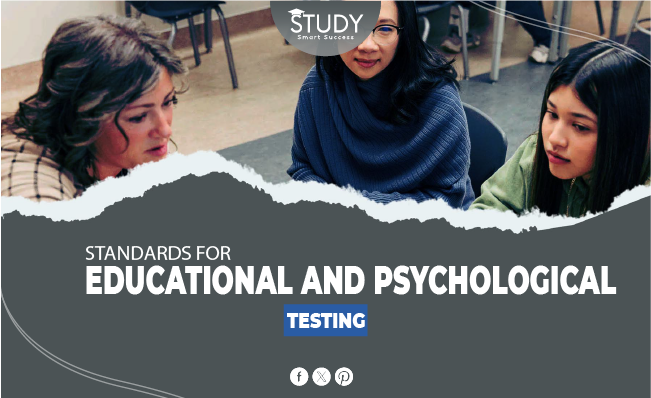Testing and evaluation are crucial in psychology and education. They provide useful information regarding student learning, mental health, and more. Following educational and psychological test guidelines ensures these instruments work properly and honestly. This comprehensive resource helps educators, scientists, and researchers comprehend and apply these principles.
Understanding the Importance of Standards
Psychological and educational examinations are standardized for reliability, accuracy, and fairness. These guidelines assist professionals in designing, administering, and interpreting tests to treat everyone reasonably and preserve their rights. Professionals can make intelligent choices based on test results if they follow these guidelines. This can help with both educational success and psychological treatments.
Ethical Considerations
Deep social concerns are at the heart of these norms. These criteria guarantee that exams don’t favor one group, respect test takers’ privacy, and are utilized as intended. Professionals must understand and follow these ethical standards to keep the testing process honest.
Technical Rigor in Test Development
To meet the psychological and educational standards discussed, it is essential to stress how technically challenging it is to make a test. Technical thoroughness ensures that tests are based not only on sound science but also on the newest information in the field.
Psychometrics requires creating tests, verifying them, and scoring them. Professionals can ensure test accuracy, reliability, and validity across several populations by adhering to scientific excellence. This commitment reduces biases and errors, making testing more fair and functional.
Critical Standards for Educational and Psychological Testing
The guidelines cover many testing areas, from making and evaluating tests to giving tests and figuring out what scores mean. Here is a list of some of the most critical standards that experts should know:
1. Validity
Validity is a test’s ability to measure what it claims. This standard stresses the importance of a proper test design and what test numbers mean for specific purposes.
2. Reliability
This standard addresses test score consistency across forms, sessions, and raters. Test data must be credible to derive conclusions.
3. Fairness
Fairness in testing includes ensuring that tests are designed and given relatively and that all test-takers are treated equally. When making and interpreting tests, it’s important to consider culture and language variety.
4. Accessibility
Ensuring everyone, even people with disabilities can take tests is the right thing to do and is often required by law. This standard tells people how to make modifications and other forms.
5. Confidentiality
Protecting the privacy and secrecy of people who take tests is very important. Test results must be handled carefully and safely by professionals, who should only share them with allowed people.
Implementing Standards in Practice
To make these standards work well, professionals need to keep up with the latest best practices and do ongoing professional development. To ensure proper testing and continuous improvement, educators, scientists, and others must collaborate.
Challenges and Solutions
Putting these standards into action isn’t always easy. Some examples are not having enough resources, not wanting to change, or not being aware of the problem. To find solutions, people need to fight for enough money, keep workers trained, and spread the word about how important standards are in tests.
Professional Development and Training
To maintain high exam standards, experts must continuously study and train. This training should cover new methodologies, societal challenges, and technology that can influence testing and review. Testing professionals must always learn and be flexible. Thus, they may keep their education and psychology practices current.
Collaboration for Improvement
Collaboration between different fields is beneficial for trying methods that work well. Professionals from other areas, like education, psychology, technology, and policymaking, collaborate to share their ideas, question current methods, and develop new ways to solve problems.
Working together in this way can help create testing methods that are more fair, effective, and open to everyone, which will benefit a broader range of people.
Technological Advancements in Testing
Using technology in testing can be helpful, but it can also be challenging. Digital platforms can, on the one hand, make tests more straightforward to take and allow for more advanced data that can help you understand test results better.
On the other hand, pros need to be careful about digital equality problems and how technology could create new biases or hurdles. It is essential for workers today to stay current on new technologies and think carefully about how they might affect testing.
Advocacy and Policy Development
To support high standards in educational and psychological tests, professionals must also speak out and help make policies. As part of this, they need to push for funding, policies that support fair testing, and laws that protect people’s rights and privacy.
By impacting policy, pros can help make the world a better place for following testing standards honestly and thoroughly.
Continuous Evaluation and Feedback
Finally, fair and successful testing requires reviewing and updating methods. Testing techniques, standards, and findings must be evaluated and revised using real-world data and public input.
Supporting ongoing development may help experts keep psychological and educational test standards current with social changes and new research on learning and feeling.
Conclusion
Psychological and educational test standards are essential for ensuring that evaluation methods are moral, accurate, and dependable. By following these guidelines, professionals can make a big difference in people’s lives and the educational and psychology groups. As technology improves and new studies emerge, testing and the standards that guide our work will also change.
All educational and psychological testing professionals must be aware of these requirements and engaged.
Under these circumstances, assessments may assist education and psychology students to grow and learn.



